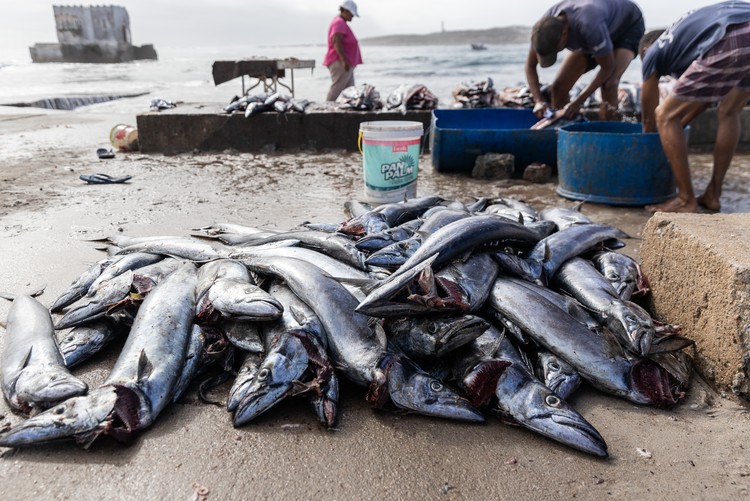
3 April 2024
Snoek on the beach at Hondeklip Bay. Fishers are angry that they do not have vessel permits for linefish. Photos: Ashraf Hendricks
Daniel Ruiter is a professional fisher but, like many of the other 12,000 small fishers in the country, he does not have a permit to catch linefish from his boat. So he got a recreational permit. But when he and other fishermen came out of the water at Hondeklip Bay on 15 March, they found police and soldiers waiting for them.
In terms of the small-scale fishing rights process finalised in November last year, Ruiter is recognised as a small-scale fisher. But he has no right to catch linefish from his boat, because he and the other Hondeklip Bay fishers do not have permits for their vessels. The Department of Forestry, Fisheries, and the Environment (DFFE) has granted just 377 vessel permits for the small-scale fishing sector for linefish and fishers say this is not enough.
The decision is being challenged. In the meantime, Ruiter and the other Hondeklip Bay fishers have been fishing with recreational permits.
But on 15 March, when they brought in their boats they found officials of the DFFE, police, and members of the South African National Defence Force waiting to check their catch. Snoek was confiscated and fines were issued.
Videos of the officers and soldiers deployed on the beach have been circulating on social media. There was “panic and fear”, says ward committee member Carisa Soudens, who has written to the DFFE asking for an apology and a meeting to discuss the rights of the fishers.
Hondeklip Bay is a small community about 90km north of Garies on the West Coast of the Northern Cape. It has a population of a few hundred people that relies a lot on fishing.
Daniel Ruiter has been fishing for about 45 years.
The DFFE’s action was “unacceptable”, said Ruiter. “They must come sit with us,” he said.
Ruiter has been a fisher for about 45 years. His father and his uncles were all fishermen. “I make my living out of the sea,” Ruiter said.
DFFE spokesperson Peter Mbelengwa said the DFFE control officer had confiscated “excess fish” after finding that several vessels on the slipway had exceeded the daily catch limit for recreational fishing.
SAPS, with support from the SANDF, had responded when members of the public started protesting against the fish being confiscated, he said.
The following day, on 16 March, the fishery control officer and SAPS had inspected the incoming vessels again but no fish had been confiscated or fines had been issued, he said. Mbelengwa said no-one was prevented from going onto the beach or from going to sea.
“The enforcement activities were not aimed at preventing legitimate permit holders from fishing, but were intended to prevent illegal catches, precisely aimed at ensuring that the legitimate and legal fishers are not adversely affected by illegal operators,” he said.
Ward committee member Carisa Soudens says the Hondeklip Bay community relies on linefish.
Small-scale fishers have complained that the allocation of 377 vessels is far from enough for the nearly 12,000 recognised small-scale fishers.
The decision to cut the number of vessels “will cripple our fisher community”, Soudens said in her letter to the DFFE. “Our community relies on linefish to keep us going for most of the year,” she said.
Without more vessels, the small-scale fishing right “means nothing,” Ruiter said.
Mbelengwa said that after a meeting with the Hondeklip Bay cooperative on 27 March, the DFFE would “consider the requests made by several cooperatives for an increase in their linefish vessel allocations”.
He said the department would respond to the cooperatives’ concerns within two weeks.
A Hondeklip Bay fisher guts and scales the fish.